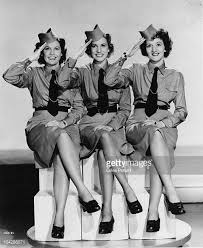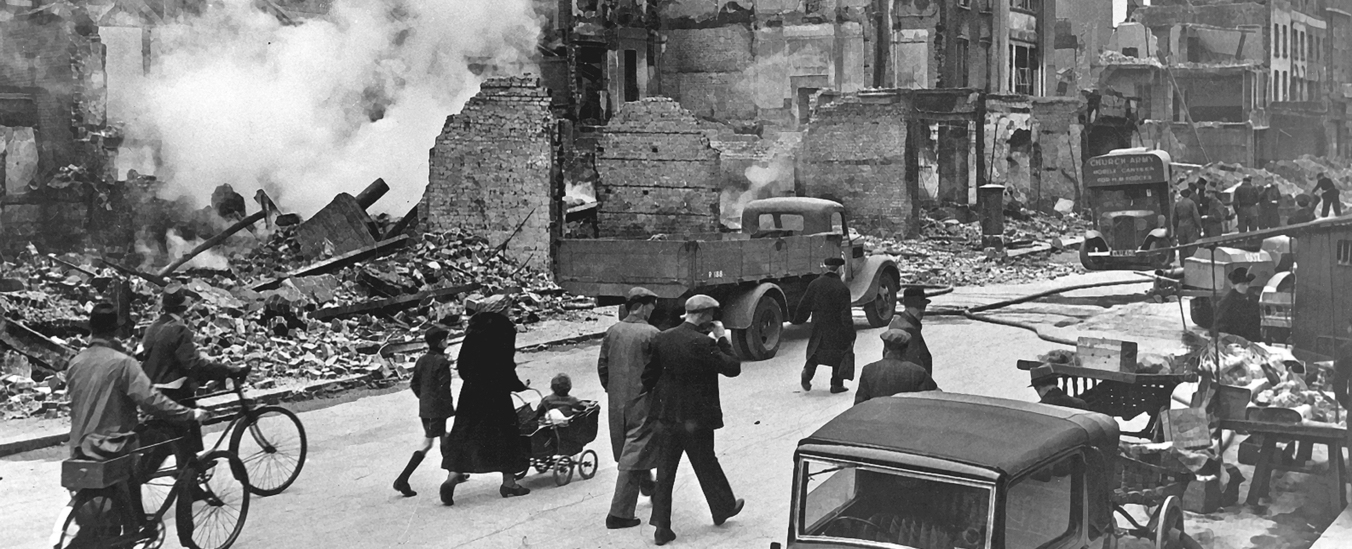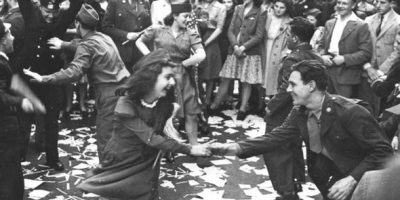The Andrews Sisters sang many famous tunes that still are referenced a lot today. Much of their songs have been re-sung by many modern-day artists like Katy Perry, Bette Midler and Christina Aguilera. The song, “Don’t Sit under the Apple Tree”, was debuted by the Andrews Sisters in a film named Private Bukaroo, in 1942.
https://www.youtube.com/watch?v=PPJZTRqQ1Xw
Conveniently during the war and in a war film. The Andrews Sisters, LaVerne Sophia, Maxene Angelyn and Patricia Marie “Patty” Andrews were a set of real sisters in a girl group. The composers of the song were, Charles Tobias and Sam H. Stept. The sisters often sang, jazz and upbeat, swing and famously the boogie-woogie. You can even see how they are dressed, in women’s army uniform saluted with a smile.

The song is sang with ‘oomph’, cheery to the listeners and even the singers given the actuality behind it. It even represents the propaganda point, ‘keep calm and carry on’ in a sense that, even though this is a sensitive matter, we can all bump, eat, drink and dance to. This song, upbeat and sing as it is, gives listeners a good insight on war relationships. The voice of the song, is a solider writing to the girl he behind at home. He tells her that he has gone, and pleads that she stay faithful to him. Hence the title, ‘don’t go sitting under the apple tree with anyone else but me’. The solider tells her to wait for him and not to move on and even slightly accuses her of flirting with another solider, a girl that fits her to the ‘T’. As seen in the lyrics listed below :
I wrote my Mother, I wrote my Father And now I'm writing you too I'm sure of Mother, I'm sure of Father And now I want to be sure Very, very sure Of you Don't sit under the apple tree with anyone else but me Anyone else but me, anyone else but me, no, no, no Don't sit under the apple tree with anyone else but me Till I come marching home. Don't go walking down Lovers' Lane with anyone else but me, Anyone else but me, anyone else but me, no, no, no Don't go walking down Lovers' Lane with anyone else but me Till I come marching home I just got word from a guy who heard From the guy next door to me The girl he met just loves to pet And it fits you to a T So don't sit under the apple tree with anyone else but me Till I come marching home Don't sit under the apple tree with anyone else but me With anyone else but her, no, no, no Not a single soul but me, no, no, no Don't you sit under the apple tree with anyone else but me Not till you see me Not until you see me marching home Home, home, home, sweet home Don't go walking down Lovers' Lane with anyone else but me With anyone else but her, no, no, no Not a single soul but me, no, no, no Don't you go walking down Lovers' Lane with anyone else but me Not till you see me Not until you see me marching home Home, home, home, sweet home Can't wait till I come marching home Don't go walking down Lovers' Lane No walking down Lovers' Lane Till you see me When you see me marching home Then we'll go arm in arm We'll sit down under the apple tree Baby just you and me When I come marching home
This song would have been a definite hit among the people during the war time, because one can only imagine this is what the solider were telling their women as they left or in letters. It really resonates with the men and women at the time because war is only really looked at in a political and economically view, really does it shed light on how it can impact lives, families and relationships. Most men were drafted and had no choice in leaving, married or not. Women were left on their own and either heard word that their significant other had died in the line of duty or, moved on fully. I think this song would have been played in hangouts for so idlers, they’re off duty watering holes and even at home at parties. The tone and beat of the song suggest fun and happy but really highlights the aftermath of war and its effect on a couple’s relationship. With insecurity, doubt and even it having it been sung by an actual man to make it even more real.
The song was sung by Glenn Miller, a man that represents all soldiers singing to their gals. I would assume that this song would leave a mark on history in music, having it be about a couples strained relationship affected by war, something that happens very often now. People are still affected by distance and the unknown of not returning, leaving people uneasy and full of insecurities that their significant other might move on.







Melissa Dinsman
You do a nice job here of thinking about the impact this song and other music would have had on both soldiers and people back home. You are right to connect music with the stories often left untold, those about family and loved ones. In your research did you come across anything about the Andrews Sisters touring with this song during the war? Did they visit the troops? Also, you mention that this song was used in a war film? What can you tell me about the film and the acting out of the song within it? Finally, you mention Glenn Miller at the end, but don’t say why he is significant to your post. Can you elaborate a bit here?
Jack
Hi Tiffany, I agree with you. I like how the song is lively and upbeat and at the same time expresses important points. For example, the lyrics clearly represent the separation between couples and the loyalty that women should have. The song indirectly suggests that since men are being loyal to their country by fighting in the war, women should also be loyal and wait for them to return without flirting with other men. Don’t Sit Under the Apple Tree also conveys a message of hope. For example, women should have faith that their husbands or partners will return from the war and not give them up for dead or move on with another man. Women should wait for their men to “come marching home.”
Sidney Scott
Hey Tiffany,
Im pretty sure this song was relatable to each and every man who served in WW2. They all wanted to make sure that their significant other had been on their best behavior and wouldn’t move on during their absence. As a question for you, do you feel that although men during WW2 had been brave, were they weak in the form of love, being that they question the loyalty of their partner? This can be seen in the song when the Andrew sisters sang” I’m sure of Mother, I’m sure of Father And now I want to be sure Very, very sure Of you”. The word very is used twice, displaying the certainty of him not wanting to be lied to.
Saima Hussain
This song was definitely on the more upbeat side. As I read through the lyrics, I felt like it the writer of this song was providing hope for the British. Indeed, it was also very relatable to men during the war. It was so interesting to see how this song also targeted both men and women, to be faithful. Even though their husbands were away, they were encouraged to patiently wait for their arrival and be faithful to their partners.